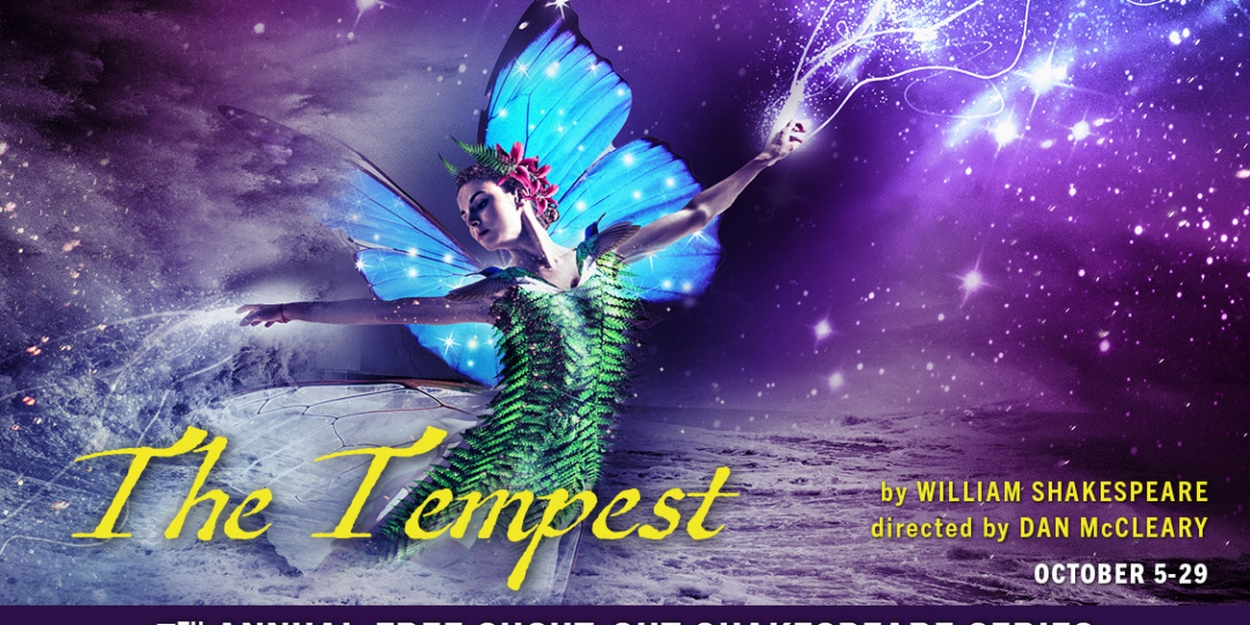THE TEMPEST Comes to Outdoor Venues in Shelby County Next Month
Performances run October 5-22.

Returning for its seventh annual Free Shout-Out Shakespeare Series, Tennessee Shakespeare Company (TSC) steps onto a mystical isle with The Tempest in ten different outdoor venues throughout the Shelby County area for free October 5-22. And for the first time in the Series’ history, The Tempest also will play indoors on TSC’s Tabor Stage for its two final performances for half-priced admission on October 28 and 29.
The Free Shout-Out Shakespeare Series, which launches TSC’s 16th season, is generously sponsored by Evans Petree PC, the National Endowment for the Arts, and the Shakespeare Fund of Theater League of Kansas City.
Outdoor performances are free and open to the public. No tickets or reservations are required: first-come/first-seated. Patrons are encouraged to bring a chair or blanket for seating, and to picnic. Indoor Tabor Stage performances require reservations by contacting TSC’s Box Office at tnshakespeare.org or (901) 759-0604.
Directed by TSC Founder and Producing Artistic Director Dan McCleary, this 90-minute production of William Shakespeare’s final romance features a thirteen-actor ensemble that includes founding member Michael Khanlarian as Prospero and TSC veterans Lauren Gunn, Stuart Heyman, and Nicolas Dureaux Picou. The ensemble also includes TSC’s inaugural Classical Theatre Apprentice Company.
This production will be played in the period Shakespeare wrote it and with all of the music and songs authored. The design team includes Jeremy Allen Fisher (scenic and lighting design), Allison White (costume design), Kristen Fisher (properties design), and Joe Johnson (sound design).
The Series spans four weeks this year, opening on October 5 outdoors at Wiseacre Brewery’s Downtown location on B.B. King Boulevard. New venues this season include Woodlawn in LaGrange, TN, Davies Manor in Bartlett, and a jubilant return to St. George’s Episcopal Church in Germantown, where TSC’s first performances were held in 2008. Returning venues include Bartlett Performing Arts Center (outdoors), Collierville Town Square, Dixon Gallery & Gardens, Overton Park Shell, Overton Square’s Chimes Square Amphitheatre, and Wiseacre Brewery’s Broad Avenue location.
In The Tempest, Shakespeare creates a science fiction in which a usurped Duke from Italy and his three-year-old daughter are exiled to the sea. Providence lands them on an uncharted island that has witnessed its own usurpations in the spirit world, leaving only the elemental Ariel and the earthen Caliban on it. Over 12 years, Duke Prospero, a self-taught wizard, raises his daughter and indentures the two island inhabitants. The Tempest begins when he creates a tempest to shipwreck the royal party responsible for his exile. His intent is vengeful. But then as his daughter falls in love, and as the elements subdue him, and as two drunken clowns attempt to usurp him again, Prospero’s heart is reawakened to what Miranda describes as a “brave new world.”
“It is a piece of theatre that is in the end quite aware of itself,” says McCleary. “But if we remain open to the story throughout, we see Shakespeare’s and the artist’s – and therefore, our humanity’s – hopeful narrative of a life creatively lived and crowned with grace, thus offering a legacy. When we get to perform this play outside, the fantastical elements have a tendency to become shared and married to the mortal. It’s a rare piece of harmony: philosophically mature yet playfully youthful.”
The Tempest is considered Shakespeare’s farewell to the stage, written in 1610-11. During a period in which he pens a group of plays that we modernly define as “romances,” it might more accurately be described as a time of self-reckoning for the playwright: where the daughters and spirit world redeem the fathers, where revenge and violence give way to forgiveness and grace, and where our human age is finally acknowledged as terminal yet ethereal.
William Shakespeare would die just five to six years after writing The Tempest, as the play foreshadows. Were it not for Shakespeare’s good friends John Heminges and Henry Condell, the play would not survive today. The two of them collected 36 of Shakespeare’s plays into one large volume titled the First Folio, which was published in 1623. Between 750-1,000 copies were printed. This year, then, marks the 400th anniversary of the printing of one of the world’s most significant and creative works. The Tempest was selected as the first play to appear in the volume.
FREE Outdoor Performance/Venue Schedule for The Tempest
Thursday, October 5 at 7:00 pm: Downtown Wiseacre Brewery
398 South B.B. King Boulevard, Memphis; no reservations required
Friday, October 6 at 7:00 pm: Overton Square’s Chimes Square Amphitheatre
2101 Madison Avenue, Memphis; no reservations required
Saturday, October 7 at 4:00 pm: Woodlawn
24545 TN-57, LaGrange, TN; no reservations required
Sunday, October 8 at 3:00 pm: Dixon Gallery & Gardens
4339 Park Avenue, Memphis; no reservations required
Friday, October 13 at 7:00 pm: Bartlett Performing Arts Center
3663 Appling Road, Bartlett; no reservations required
Sunday, October 15 at 4:00 pm: Overton Shell
1928 Poplar Avenue, Memphis; no reservations required
Thursday, October 19 at 7:00 pm: Broad Avenue Wiseacre Brewery
2783 Broad Avenue, Memphis; no reservations required
Friday, October 20 at 7:00 pm: St. George’s Episcopal Church
2425 S. Germantown Rd., Germantown; no reservations required
Saturday, October 21 at 7:00 pm: Collierville Town Square’s Train Depot
96 N. Center Street, Collierville; no reservations required
Sunday, October 22 at 3:00 pm: Davies Manor
9336 Davies Plantation Road, Bartlett; no reservations required
Half-Price Tabor Stage Performances, Reservations Required:
Saturday, October 28 at 7:30 pm: Tennessee Shakespeare Company
Sunday, October 29 at 3:00 pm: Tennessee Shakespeare Company
Comments
Videos

